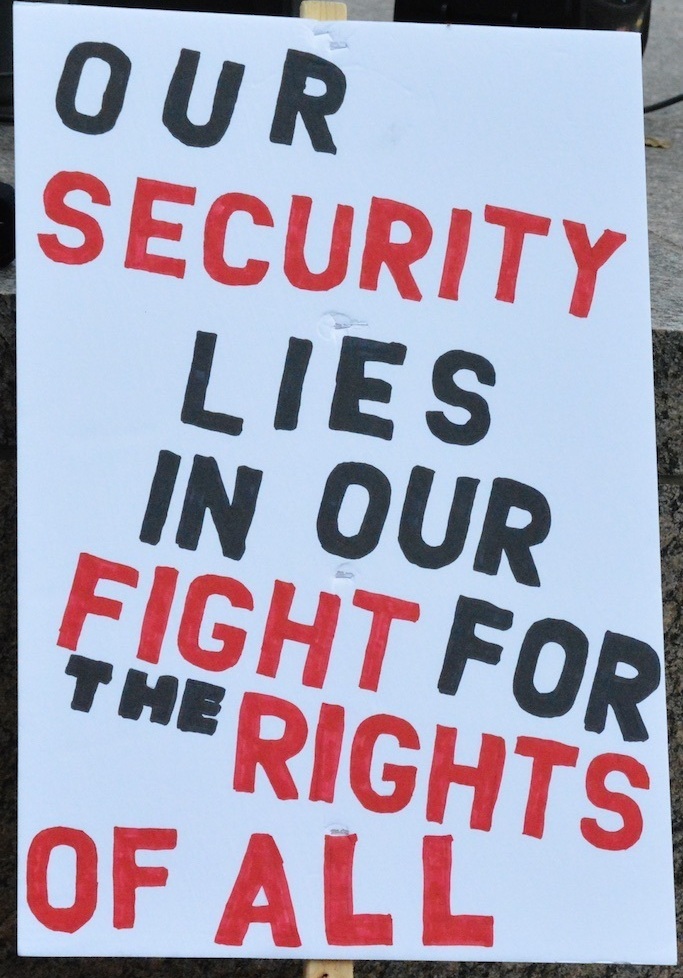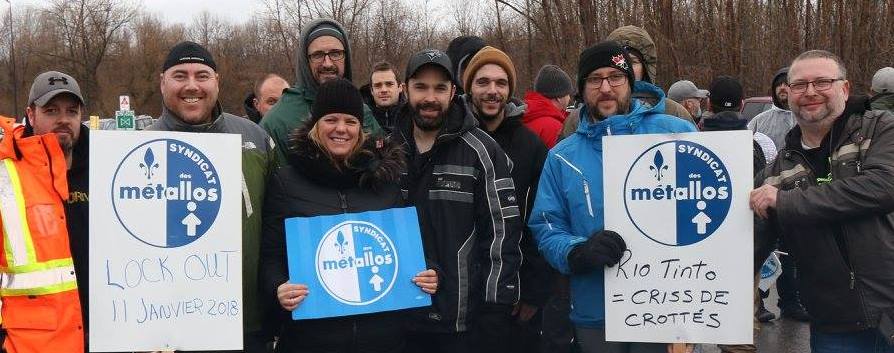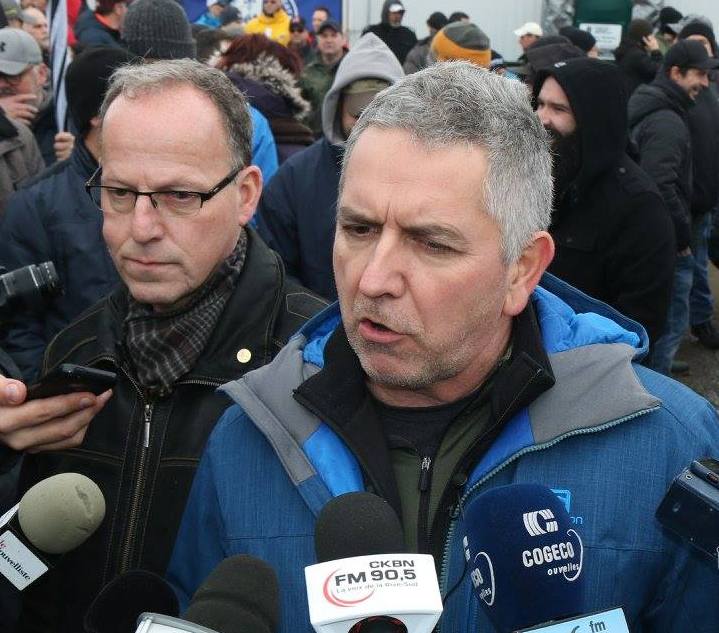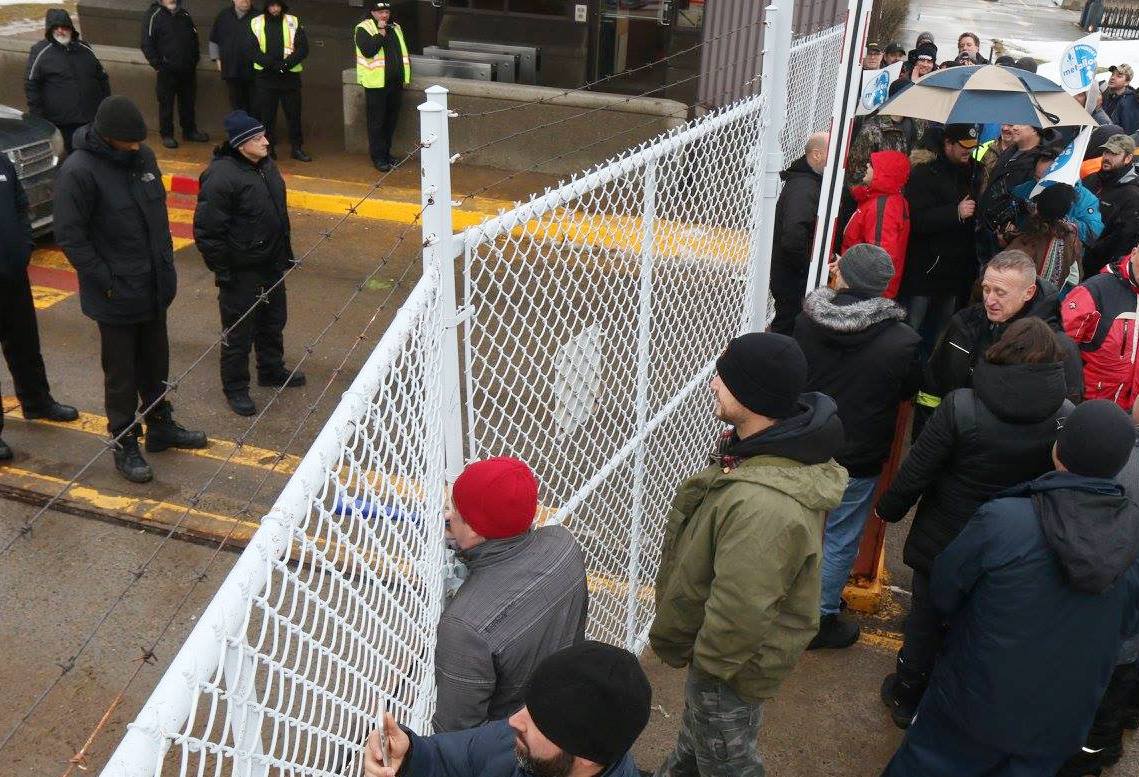|
January 18, 2018
Our Security Lies in the Fight for
the Rights of All!
Workers Stand as One to
Defend Their Rights
PDF
  
Our
Security
Lies
in
the
Fight
for the Rights of All!
• Workers Stand as One to
Defend Their Rights
The
Canadian
Trade
Union
Movement Unravels
• How Will Unifor Splitting from the CLC Help
Workers Defend Their Rights?
Lockout
at
the
ABI
Smelter
in
Bécancour,
Quebec
• Stand with Locked Out Aluminum Smelter
Workers!
• Interview with Clément Masse,
President of Steelworkers Local 9700
• Let's All Get Behind ABI Steelworkers
Fighting for Their Dignity
and Unity! - Letter to the Editor
Our Security Lies in the Fight for the
Rights of All!
Workers Stand as One to Defend Their Rights
Many workers across Canada are facing
intransigent private or public employers unwilling to discuss and
negotiate terms of employment. Instead, they are using lockouts,
legislation, court orders and diversion to impose their will.
Such
is
the case with public service workers in Nova Scotia, teachers and
education workers in Ontario and others who have faced government
anti-worker legislation imposing terms of employment on them rather
than hashing out an acceptable collective agreement.
 In Hamilton, members
of Local 1005 USW, at one of the
Stelco mills taken over by by German monopoly Max Aicher North
America (MANA) in 2010, have faced lies and extortion. After
promising the moon when it purchased the mill from U.S. Steel receiving
financial incentives from the Ontario government, MANA bared
its fangs in 2013 demanding unacceptable concessions from
Local 1005 steelworkers and locked them out in an attempt to
enforce its "final offer." The lockout was immediately followed by a
court injunction preventing effective picketing by Local 1005.
MANA hired scab replacement workers including students sent from Mohawk
College, a publicly-funded institution. Members of Local 1005 and
their supporters have intervened to stop the flow of scabs from Mohawk
and vowed not to give in. They are militantly defending their
right to employment at the mill on terms acceptable to themselves. In Hamilton, members
of Local 1005 USW, at one of the
Stelco mills taken over by by German monopoly Max Aicher North
America (MANA) in 2010, have faced lies and extortion. After
promising the moon when it purchased the mill from U.S. Steel receiving
financial incentives from the Ontario government, MANA bared
its fangs in 2013 demanding unacceptable concessions from
Local 1005 steelworkers and locked them out in an attempt to
enforce its "final offer." The lockout was immediately followed by a
court injunction preventing effective picketing by Local 1005.
MANA hired scab replacement workers including students sent from Mohawk
College, a publicly-funded institution. Members of Local 1005 and
their supporters have intervened to stop the flow of scabs from Mohawk
and vowed not to give in. They are militantly defending their
right to employment at the mill on terms acceptable to themselves.
In
Sault
Ste.
Marie,
steelworkers and salaried employees at the Algoma
Steel plant have been under emergency court order of the anti-worker Companies' Creditors
Arrangement Act (CCAA) three times in the last 25 years. The
latest bout in CCAA has now entered its third
year. Those in control of the mill and the court process are trying to
force steelworkers and salaried employees to give in to pressure to
work without collective agreements and accept unilaterally imposed
terms of employment under court order. The 2,235 hourly
steelworkers of USW Local 2251 and the 470 salaried employees
of USW Local 2724 have refused to do so and demand negotiations
under Ontario's Labour
Relations
Act without the interference, constraints and dictate of
the CCAA.
Workers'
Forum calls on all Quebec and Canadian workers to stand as one with
the ABI smelter workers in Quebec, who we report on in this issue, and
all other workers actively
engaged in class struggle in defence of their rights. The organized
working class is taking up the social responsibility to itself and
society to
find a way to deprive the global monopolies of their power to deprive
workers of their rights. It can be done through determined collective
struggle! It must be done!

The Canadian Trade Union Movement Unravels
How Will Unifor Splitting from the CLC Help
Workers Defend Their Rights?
In an incredibly destructive move, the largest
private-sector union
in the country, Unifor, has decided to split from the Canadian Labour
Congress (CLC). Such a move can only help the Liberal government's
anti-social neo-liberal agenda by creating diversionary issues. Those
issues become yet more obstacles hindering workers from uniting
against the attacks on their rights and developing a movement to
resolve the crisis in their favour. In this regard, how does the Unifor
decision unite workers to take stands that favour them as concerns the
anti-worker bills on pensions and other matters the Liberal government
is presently pushing through Parliament?
Amongst other things, Unifor's President has just been
in the U.S.
speaking to Trump's Commerce Secretary Wilbur Ross. Ross is directly
known to steelworkers as the incredibly rich American who engineered
the destruction of Canadian steelmaking. We hope that Unifor's
complaints of "American unions" interfering in Canadian
elections does not have in mind Unifor's main rival, the United Steel
Workers better known as USW or "Les Metallos." USW is an international
union, not American per se. Whatever the Unifor President means, the
fact remains that the federal Liberal government is also promoting
security legislation that targets foreign interference in
elections. Electoral reform making foreign cyber attacks during
elections a main issue, de facto seeks to deprive Canadians of their
right to speak and to organize themselves politically. All this chatter
of "foreign interference in elections" both in the U.S. and Canada is
done in the name of protecting national security and democracy without
challenging the status quo and electoral process that actually
disempowers the people and blocks them from exercising their democratic
right to elect and be elected.
 So
too for years, first the Canadian Auto Workers (CAW) and now its
successor Unifor, have sought to cover up their own striving for
hegemony in the trade union movement by saying all they are doing is
defending democracy. However, similar to the Liberals in power in
Ottawa and elsewhere, they never engage workers in discussing what
democracy means to them and how they think it can be defended and
renewed. Unifor has long been vying for control of the CLC's agenda by
having it submit to Liberal power politics, not those of the NDP
championed by its main rival. Rank and file workers in the forefront of
struggle against the anti-social offensive have been held hostage to
this sectarian warfare. So
too for years, first the Canadian Auto Workers (CAW) and now its
successor Unifor, have sought to cover up their own striving for
hegemony in the trade union movement by saying all they are doing is
defending democracy. However, similar to the Liberals in power in
Ottawa and elsewhere, they never engage workers in discussing what
democracy means to them and how they think it can be defended and
renewed. Unifor has long been vying for control of the CLC's agenda by
having it submit to Liberal power politics, not those of the NDP
championed by its main rival. Rank and file workers in the forefront of
struggle against the anti-social offensive have been held hostage to
this sectarian warfare.
A serious problem is that this sectarian warfare for
power in the
CLC in no way renovates the trade unions, national or international, to
make them more effective and capable of coping with the neo-liberal
anti-social offensive. The offensive of the ruling elite has savaged
social programs, driven down the standard of living of most working
people and smashed the social contract. Workers' unions are now
routinely blocked with legislation, court injunctions and the global
power of monopolies from even negotiating wages, working conditions and
pensions in good faith. A dictate or "final offer" is thrown at them
and they are told to take it voluntarily or face penalties including
jail,
job loss, etc..
In most cases, the sectarian warfare has left trade
unions weakened
as they are supposed to line up behind one side or the other. This is a
time the trade unions need to mobilize their members and fellow workers
across the country to unite in action to defend their rights and the
rights of all, not engage in this kind of diversionary sectarian
warfare.
Unifor seems to have taken up the Liberals' bankrupt
propaganda
that the problem with elections in Canada for government is foreign
interference, and now we are to believe this is also the case for
elections for union leadership. This ignores the workers' experience on
many fronts. It does however highlight that what the workers need is to
mobilize the working people to fight for their own empowerment and
build their own organizations independently of the influence of the
ruling imperialist elite and their thinking which is always
self-serving. Regarding government power, the current electoral system
of representation to establish the legitimacy of a mandate for
governments is
broken. The reasons for this need to be discussed and analyzed by the
workers if they are to provide a remedy, which they must because the
ruling class clearly cannot.
 To
split the CLC does not provide a nation-building alternative to a CLC
clearly mired in its own refusal to renovate itself to meet the
requirements of the times. What remedies are either the CLC or Unifor
offering to the problem of governments or trade unions which no longer
represent what Canadians want? Unifor may be a "national
union" but what are its politics? To declare that the problem is
"interference by American unions" begs the question of what both
"national" and "international" unions are doing in practice to uphold
the rights of workers under the current conditions and to mobilize them
in their millions to defend those rights. To
split the CLC does not provide a nation-building alternative to a CLC
clearly mired in its own refusal to renovate itself to meet the
requirements of the times. What remedies are either the CLC or Unifor
offering to the problem of governments or trade unions which no longer
represent what Canadians want? Unifor may be a "national
union" but what are its politics? To declare that the problem is
"interference by American unions" begs the question of what both
"national" and "international" unions are doing in practice to uphold
the rights of workers under the current conditions and to mobilize them
in their millions to defend those rights.
Unifor seems to be blaming others to divert attention
from its own
positions in support of the Liberals whose narrow interests are not
served by uniting working people to defend the rights of all regardless
of their union affiliation. The truth of the matter is in the reality
that Unifor and others including the CLC and USW have been incapable
of uniting the workers' movement in a genuine nation-building project.
If they were capable of this, Canadian workers would not be in such a
retreat in the face of the anti-social offensive of the ruling elite.
In the face of great difficulties, workers engaged in
struggles
across the country are taking their own initiatives to defend
themselves and are doing what they can to unite everyone to affirm
their rights and speak out in defence of what belongs to them by right.
This latest move by Unifor does not favour the efforts of workers to
unite in action
to defend their rights. It looks like yet another act of neo-liberal
wrecking to dishearten, not renew, the working class movement.
Workers have no reason either to be disheartened or
elated by
Unifor's move. It is what it is, over which workers have little control
at this time. They can respond to this sectarian wrecking by sticking
to their own agenda, which they themselves establish, an agenda that
responds to their needs as they see them from the vantage point of
their
own front of struggle. In this way they can defend their movement for
their rights and the rights of all, and ensure their struggles are not
diverted and smashed.
See full statement by Unifor
and CLC,
and
the
report
by
Canadian
Press.

Lockout at the ABI Smelter in
Bécancour, Quebec
Stand with Locked Out Aluminum
Smelter Workers!

January 12, 2018, steelworkers rally outside smelter following the
lockout the previous day.
The Rio Tinto Group and Alcoa global monopolies locked
out 1,030 workers at the ABI aluminum smelter in Bécancour,
Quebec
on January 11. The smelter workers' union, USW
Local 9700, immediately denounced the lockout as an odious measure
with a hidden agenda.
The Bécancour plant is owned 25.1 per cent by
Rio Tinto and 74.9 per cent by Alcoa. Worldwide, these two monopolies
control the production of aluminum and other commodities produced by
more than 100,000 workers. Through their overwhelming control, the
monopolies routinely
manipulate the supply and price of aluminum to serve their narrow
private interests. This is not the first time they have used a lockout
to reduce
aluminum production to put upward pressure on market prices while at
the same time putting pressure on workers in a particular plant to
accept
concessions. The main concessions the monopolies demand at ABI are
destruction of the workers' defined-benefit pension plan and changes to
the long-established seniority system.
The global control of production of
particular commodities by one or two monopolies has become a problem
for workers worldwide. This control becomes a weapon against
workers, as production and sales can be shifted from one
facility to another to attack the working class and
even
economies worldwide.
Workers at the ABI smelter rejected the company's
demands for concessions less than 24 hours before the lockout. The
immediate lockout and shutting down of
certain potlines indicated that the company was already preparing for a
lockout. Reducing
aluminum supply on the market while at the same time pressuring
workers to accept concessions and the Quebec government to lower
electricity prices appears as a premeditated scheme.
ABI workers have denounced the lockout
and the company's refusal to negotiate. This anti-social behaviour is
unacceptable anywhere in Quebec and Canada. They have called on all
Quebec and Canadian workers to denounce the actions of Rio
Tinto/Alcoa and demand an end to the lockout and
a return to
negotiations.
Comments by Union Leaders

Rally January 12, 2018, the day after steelworkers were locked out.
Alain Croteau, head of the Quebec section of
the United Steelworkers (USW) said, "We think that financial interests
are
behind (the lockout). When a big smelter such as Alcoa here in
Bécancour doesn't produce, it takes aluminum off the market and
drives
up prices. We think the lockout will last two or three months, minimum.
It could go to
six, seven, eight months, maybe more, we don't know. It's sad for the
population. It's sad for the families and the workers here."
ABI Local 9700 President Clément Masse
denounced
the lost production and value because of the shutdown of the potlines
which he pointed out will be greater than the monetary amount that
separated the two parties before negotiations were abruptly suspended.
That reality alone exposes a hidden agenda regarding aluminum prices,
lowering the price of electricity and imposing a new anti-worker
pension
and
seniority regime on workers throughout their plants in Quebec.
Regarding the duration of the lockout President Masse
said, "Just stopping the tanks and restarting them,
we're talking about many millions of dollars. If the employer took the
decision to close two series of tanks, it's because they don't think
they are going to settle this next week."
What Are the Issues Behind ABI's Odious Lockout?

USW issued a press release on January 12 to denounce the
lockout of the ABI aluminum smelter workers. USW points out that the
lockout will cause suffering throughout
the entire Mauricie region, in addition to the direct hardships for the
1,030 workers at the plant, their families and the many suppliers and
others connected with the plant.
USW says the company's foreign owners have refused to
give local plant officials a mandate to settle at the bargaining table.
Exposing the premeditated scheme, Local 9700 President Masse notes, "We
realized yesterday that a series of potlines was being shut down even
before a meeting between the parties, convened by the government
mediator, had begun." He added, "The company's Human Resources Director
indicated very clearly that he 'did not have a mandate to negotiate.'
It makes you wonder whether the real issues in this dispute were
actually at the bargaining table or in the commercial interests of
these two aluminum sector giants."
The paralysis of the company's local representatives
goes beyond this past week's events, Masse adds, "In December, when
negotiations were going well and important steps had been taken on the
pension plan, the company preferred to break off
negotiations and file a final offer rather than closing the loop with a
negotiated
settlement."
USW says the two monopolies want to destroy the
workers' defined benefit pension plan and the long-standing
arrangements
dealing with seniority, just as the plant is experiencing
a large influx of new workers.

Steelworkers Quebec Director Croteau notes that the
steelworkers at the Rio Tinto smelter in Alma, Quebec went through a
similar lockout in 2012. He states in
the press release, "This company doesn't think twice about making
hundreds of families suffer and impoverishing an entire region if their
commercial interests are at stake. But today we know that they will be
able to cause the price of several aluminum products to increase and
maybe the American Midwest premium as well, while continuing to supply
the market out of plants that they own 100 per cent, rather than
a 25 per cent stake."
In 2012, as Rio Tinto was planning to lock out the Alma
workers, there was surplus production in the global aluminum market and
stopping production at the Alma plant contributed to lowering aluminum
stocks, thereby driving up market prices.
Also of concern are the constant demands from Alcoa for
the Quebec government and its public hydro utility to lower electricity
rates for its plants. Manipulating prices in favour of certain powerful
private interests is a factor in recurring economic crises.
Electricity is a major already-produced value required to produce
aluminum.
"Should we be reading into this lockout a tactic for spreading
uncertainty and bringing about lower electricity rates?" Croteau
asks.
Local 9700 says it is ready to
resume negotiations but needs the global monopolies to respond in kind.
"Several of the outstanding issues in the negotiations concern labour
turnover. These are work organization issues that don't necessarily
have an important monetary impact, but they do require a spirit of
openness
on the part of the company. A settlement is certainly possible, but
only if the company wants it," Local 9700 President Masse
emphasizes.

Interview with Clément Masse,
President of Steelworkers Local 9700

Workers' Forum: What were the circumstances
surrounding the lockout of the 1,030 ABI aluminum smelter workers?
|

Clément Masse (right) speaks to press during January 12, 2018
rally.
|
Clément Masse: On the night of Wednesday to
Thursday, January 11, at three o'clock in the morning, the employer
representative informed us that he was decreeing a lockout. Previously,
on Tuesday and Wednesday, January 9 and 10, workers rejected,
by a vote of 80 per cent and a turnout
of 85 per cent, the "final and comprehensive" offer of the
employer.
Following the rejection of the offer, we were not able
to meet with the employer. We informed him of the workers' vote.
We expected that there would be a meeting with the mediator who has
been assigned to the negotiations. Instead of meeting with us,
discussing the differences that remain between the two parties,
the
employer locked us out and immediately began shutting down two sets of
potlines in the plant. The employer made no attempt to try to find a
compromise.
WF:
What was the content of the latest offer from the
company?
CM: The offer was different from the
one rejected by a vote of 97 per cent
with the participation of 90 per cent of the members on
November 22. The present offer was not as bad as the previous one,
but not
really much better. In terms of the pension plan, there have been some
changes in the employer's offer, but we still have questions. This is a
major piece in this negotiation and we may not have been far from an
agreement, but we needed more discussion and the employer simply
refused to discuss. On the other hand, with regard to job
mobility, on the question of seniority, and particularly on job
postings,
the employer's offer was totally unacceptable. Our
demand is that seniority remains as far as job mobility is concerned.
These are the two main points on which the employer's final offer was
rejected.
WF: What are the latest
developments since the beginning of the lockout?
CM: Our workers are angry and
are asking that the employer come back to the table to negotiate with
us. We set up our picket lines as soon as the lockout began. We are now
under an injunction that limits the number of picketers to 15 per
trailer in each of four trailers around the plant. The injunction
prohibits us from entering company property, from blocking trucks
that take the subcontractors into the plant and from
"intimidating" management people. The injunction orders us not to
come closer than five feet from management people. There is also a
private security agency that has been hired and is there to watch
us 24 hours a day seven days a week.
WF: In a recent statement you
say that the conflict goes beyond a local conflict between the company
and the ABI workers. Can you tell us more about this?
CM: Given the cost of
shutting down these two sets of potlines, which far exceeds the cost of
a settlement of this dispute, it can be said that employers surely have
other goals than just negotiating our terms.
If the employers wanted a settlement, they would have
come back to the table. One has the impression with the lockout that
the employers have other elements they want to sort out. Among other
things, there is the price they are paying for hydro. To modernize the
plant, the employer needs another hydro line to be set up in the
industrial
park, and the question of who will pay the costs for the line is a big
issue for Alcoa. We know that there have been discussions between Alcoa
and Hydro-Québec. Alcoa is always looking to lower its hydro
prices and it is possible that the lockout is a lever to
force a reduction in what they pay for electricity.
One also wonders with the pension plan whether they
want to make it a model for their other plants in Quebec. The same
thing with regard to seniority. We have no evidence of this but we are
not the only ones who think this.
The fact remains that the employer left the table while
we were negotiating on December 21. There was a mediator taking
part in the negotiations. The demand for a mediator actually came
from the company. The mediator himself said that there was some headway
in the negotiations. So why did the employer suddenly decide to
stop bargaining on December 21? It just presented its "final and
comprehensive" offer and made no attempt to resume the discussions.
Then, after the holidays, we held our meetings. During all that time,
it appears the employer was just waiting to lock us out.
As well, during that time and since the beginning, our
proposal was not to go on strike. We said in a press briefing that our
goal was not to exercise our right to strike at this time but to bring
the employer back to the bargaining table. This is still our goal today.
WF: We understand support from
other steelworker locals has started to come in.
|

ABI smelter workers, Steelworkers Local 9700, at support rally for
striking
Rio Tinto workers in Alma, February 9, 2012.
|
CM: Yes, the local of the Rio Tinto
workers in Alma has publicly expressed its support. The local
President Alexandre Fréchette gave interviews to say
they are with us and other locals have begun to express their support.
USW Quebec Director Alain Croteau has called on all locals to consider
what
help they can give us, including financial support. Of course, we have
our strike relief payments that we give to workers but any help is
greatly appreciated. It must also be said that our local is known for
its generosity to other workers engaged in a conflict, so we appreciate
the support that other locals give us now when we are in a labour
dispute.
WF: Do you want to say
something in conclusion?
CM: I remember the words of the
Rio Tinto worker in Alma, who wrote a song during the lockout
in 2012 that said, "I prefer standing on the lines to being on my
knees in the plant." This sums up very well how we feel right now.

Let's All Get Behind ABI Steelworkers Fighting
for Their Dignity and Unity!
- Letter to the Editor -
In the middle of the night of January 4, the
owners of the ABI aluminum smelter in Bécancour, Quebec locked
out the 1,030 workers at the plant, one of the largest employers
in Mauricie-Centre-du-Québec. The issues at stake revolve around
the workers' opposition to two-tier working and retirement conditions.
Workers
oppose two-tier working conditions as a matter of principle and from
the point of view of the dignity of labour and their unity, which are
intrinsically linked.

To produce a large quantity of quality aluminum for the
economy, which is of great value, is a dignified act deserving respect.
The dignity of labour, the dignity of those who are producing aluminum
value for the economy is a fundamental aspect of modern life. Whenever
this dignity of labour is disrespected, the working class must respond
with unity and a collective organized struggle for the rights of those
abused.
To allow the owners of the ABI smelter to impose
conditions that go against the principle of one working class with
undivided rights, is to disrespect the aluminum workers who produce
such great quantities of value for Quebec. This is unacceptable to the
workers of the plant and to all workers throughout Quebec and Canada.
The lowering of conditions at the plant with respect to
pensions would also cause harm to the general standard of living in the
region that depends a lot on the reproduced-value workers claim from
the value they produce both while working and in retirement.
ABI workers say they suspect that the Alcoa and Rio
Tinto monopolies that jointly own the plant, with Alcoa having 75
per cent ownership and Rio Tinto 25 per cent, are using the
lockout to obtain concessions from the government of Quebec,
particularly with respect to the price they pay for hydroelectricity,
which they are
constantly seeking to lower. This would not be the first time that
Alcoa tried to force lower prices for electricity. In 2014, this
U.S. monopoly even threatened to close its three aluminum smelters in
Quebec if the Quebec government did not lower the price for
hydroelectricity. To lower the price for Alcoa means others in Quebec
have to pay
more for their electricity or have Hydro-Québec go further into
debt.
This is unacceptable to all.
Other workers say the lockout may also be a ploy to
lower production of aluminum in Québec to put some upward
pressure on the market price of aluminum globally. Alcoa and Rio Tinto
are by far the major suppliers of aluminum worldwide and are in
position to control the supply and pass the burden of shutdowns onto
the
backs of workers
and even use them as a means to force concessions.
Time will tell what the extent of the various plots may
be. The fact remains that those who own and control the plant from
outside Quebec unilaterally broke off negotiations with the workers
last December, when workers say an agreement they could accept was
within grasp. The owners walked away from further talks with the
workers and
issued an unacceptable "final and comprehensive" offer, which workers
rejected. The following day those in control declared a lockout that
was obviously planned in advance.
Workers say they are bracing for a lengthy conflict,
as the global owners seem determined to make it so, but remain willing
to negotiate and finalize a contract immediately that is acceptable to
them and does not disrespect and trample on their rights and dignity.
All Quebec and Canadian workers should provide the ABI workers
with
whatever assistance they can in this struggle in defence of their
rights.

PREVIOUS
ISSUES | HOME
Website: www.cpcml.ca
Email: office@cpcml.ca
|



 So
too for years, first the Canadian Auto Workers (CAW) and now its
successor Unifor, have sought to cover up their own striving for
hegemony in the trade union movement by saying all they are doing is
defending democracy. However, similar to the Liberals in power in
Ottawa and elsewhere, they never engage workers in discussing what
democracy means to them and how they think it can be defended and
renewed. Unifor has long been vying for control of the CLC's agenda by
having it submit to Liberal power politics, not those of the NDP
championed by its main rival. Rank and file workers in the forefront of
struggle against the anti-social offensive have been held hostage to
this sectarian warfare.
So
too for years, first the Canadian Auto Workers (CAW) and now its
successor Unifor, have sought to cover up their own striving for
hegemony in the trade union movement by saying all they are doing is
defending democracy. However, similar to the Liberals in power in
Ottawa and elsewhere, they never engage workers in discussing what
democracy means to them and how they think it can be defended and
renewed. Unifor has long been vying for control of the CLC's agenda by
having it submit to Liberal power politics, not those of the NDP
championed by its main rival. Rank and file workers in the forefront of
struggle against the anti-social offensive have been held hostage to
this sectarian warfare. To
split the CLC does not provide a nation-building alternative to a CLC
clearly mired in its own refusal to renovate itself to meet the
requirements of the times. What remedies are either the CLC or Unifor
offering to the problem of governments or trade unions which no longer
represent what Canadians want? Unifor may be a "national
union" but what are its politics? To declare that the problem is
"interference by American unions" begs the question of what both
"national" and "international" unions are doing in practice to uphold
the rights of workers under the current conditions and to mobilize them
in their millions to defend those rights.
To
split the CLC does not provide a nation-building alternative to a CLC
clearly mired in its own refusal to renovate itself to meet the
requirements of the times. What remedies are either the CLC or Unifor
offering to the problem of governments or trade unions which no longer
represent what Canadians want? Unifor may be a "national
union" but what are its politics? To declare that the problem is
"interference by American unions" begs the question of what both
"national" and "international" unions are doing in practice to uphold
the rights of workers under the current conditions and to mobilize them
in their millions to defend those rights.






